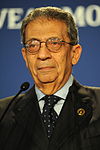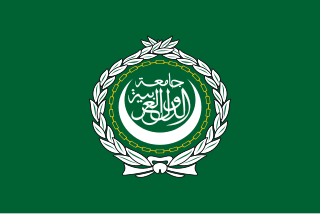
The Arab League, formally the League of Arab States, is a regional organization in the Arab world, which is located in North Africa, West Asia, and part of East Africa. The Arab League was formed in Cairo on 22 March 1945, initially with six members: Egypt, Iraq, Transjordan, Lebanon, Saudi Arabia, and Syria. Yemen joined as a member on 5 May 1945. Currently, the League has 22 members.

The Arab world, formally the Arab homeland, also known as the Arab nation, the Arabsphere, or the Arab states, comprises a vast group of countries, mainly located in Western Asia and Northern Africa. While the majority of people in the Arab world are ethnically Arab, there are also significant populations of other ethnic groups such as Berbers, Kurds, Somalis and Nubians, among other groups. Arabic is used as the lingua franca throughout the Arab world.
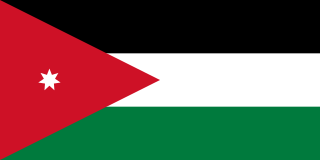
The Jordanian annexation of the West Bank formally occurred on 24 April 1950, after the 1948 Arab–Israeli War, during which Transjordan occupied territory previously part of Mandatory Palestine and, excluding Jerusalem, earmarked by the UN General Assembly Resolution 181 of 29 November 1947 for an independent Arab state to be established there alongside a Jewish state mainly to its west. The annexation tripled the population of Transjordan, from 400,000 to 1,300,000.
The Arab League was formed in Cairo on 22 March 1945 with six members: Egypt, Iraq, Transjordan, Lebanon, Saudi Arabia, and Syria. Yemen joined on 5 May 1945. Since its formation the Arab League has promoted the Palestinian Arab cause in the Israeli–Palestinian conflict, including by imposing the Arab League boycott of Israel. The Arab League opposed the United Nations Partition Plan for Palestine in 1947. On 15 May 1948, the then seven Arab League members coordinated an invasion of what was by then the former British Mandate, marking the start of the 1948 Arab–Israeli War.
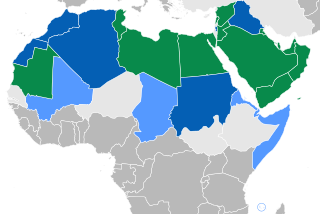
Modern Standard Arabic (MSA) and Modern Written Arabic (MWA) are terms used mostly by Western linguists to describe the variety of standardized, literary Arabic that developed in the Arab world in the late 19th and early 20th centuries; occasionally, it also refers to spoken Arabic that approximates this written standard. MSA is the language used in literature, academia, print and mass media, law and legislation, though it is generally not spoken as a first language, similar to Contemporary Latin. It is a pluricentric standard language taught throughout the Arab world in formal education, differing significantly from many vernacular varieties of Arabic that are commonly spoken as mother tongues in the area; these are only partially mutually intelligible with both MSA and with each other depending on their proximity in the Arabic dialect continuum.

The Council of Arab Economic Unity (CAEU) was founded by Egypt, Iraq, Jordan, Kuwait, Libya, Mauritania, Palestine, Saudi Arabia, Sudan, Tunisia, Syria, United Arab Emirates and Yemen on May 30, 1964, following an agreement in 1957 by the Economic Council of the Arab League.

The Arab Club Champions Cup is an annual club football competition organised by the Union of Arab Football Associations (UAFA) and contested by top-division clubs from the Arab world. The tournament is contested by a total of 37 teams from the Asian Football Confederation and the Confederation of African Football.

Al Ettifaq Football Club is a professional football club in Dammam, Saudi Arabia. It was established by the merger of three Damman clubs in 1944. Al Ettifaq were the first Saudi team to win an international title – the 1984 Arab Club Champions Cup. They were also the first to win the Saudi Premier League without any defeats, and the first Saudi team to win the GCC Champions League. Al Ettifaq have a total of 13 different titles to their name. The club also has its own futsal section.

The United Arab Emirates Football Association is the governing body of association football, beach soccer and futsal in the United Arab Emirates.

The Arab League or League of Arab States was founded by Egypt in 1945, has 22 members and seven observer members so far: Armenia, Brazil, Chad, Eritrea, Greece, Republic of India, Venezuela.

The Headwater Diversion Plan was an Arab League plan to divert two of the three sources of the Jordan River, and prevent them from flowing into the Sea of Galilee, in order to thwart Israel's plans to use the water of the Hasbani and Banias in its National Water Carrier project for out-of-Basin irrigation. The plan was approved by the Arab League in 1964 but Israel prevented the project's development by conducting airstrikes in Syrian territory in April 1967.
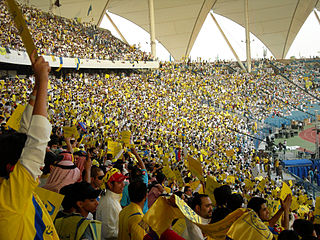
Football is the most popular sport in Saudi Arabia. Football in Saudi Arabia is governed by the Saudi Arabia Football Federation (SAFF). It was founded in 1956. It administers both the club competitions and the national football teams of Saudi Arabia.
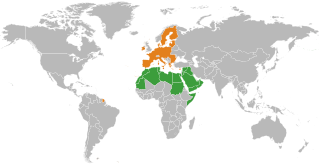
The Arab League and European Union have shared relations since the EU's development into a more political power rather than an economic one. At the 19th summit of the Arab League in Saudi Arabia, Javier Solana attended the summit. He gave the EU's full support to the Arab League's Peace Initiative of 2002. At the summit, he addressed the Arab Leaders:

The Arab League has 22 member states. It was founded in Cairo in March 1945 with six members: the Kingdom of Egypt, Kingdom of Iraq, Lebanon, Saudi Arabia, Syrian Republic, and Transjordan. North Yemen joined on 5 May 1945. Membership increased during the second half of the 20th century. Seven countries have observer status. The headquarters are located in Cairo, Egypt.

The UAE Pro League, known for sponsorship reasons as the ADNOC Pro League, is the top professional football league in the United Arab Emirates (UAE). The first team to win the title was Al Orouba (Sharjah), whilst Al Ain has the record with 14 league titles to their name. Fourteen clubs compete in the League that operates on a system of promotion and relegation with the First Division League.

On December 19, 2011, the Syrian government agreed to allow foreign observers from the Arab League to monitor Syria's progress in removing troops from protest areas, free political prisoners, and negotiate with dissidents. The mission was in accordance with the Arab League peace plan aimed to resolve the Syrian crisis. The monitors were dispatched and supported by the Arab League.

Mandatory Palestine was a geopolitical entity established between 1920 and 1948 in the region of Palestine under the terms of the League of Nations Mandate for Palestine.

The Arab Higher Committee or the Higher National Committee was the central political organ of the Arab Palestinians in Mandatory Palestine. It was established on 25 April 1936, on the initiative of Haj Amin al-Husayni, the Grand Mufti of Jerusalem, and comprised the leaders of Palestinian Arab clans and political parties under the mufti's chairmanship. The committee was outlawed by the British Mandatory administration in September 1937 after the assassination of a British official.

The Arab League boycott of Israel is a strategy adopted by the Arab League and its member states to boycott economic and other relations between Arabs and the Arab states and Israel and specifically stopping all trade with Israel which adds to that country's economic and military strength. A secondary boycott was later imposed, to boycott non-Israeli companies that do business with Israel, and later a tertiary boycott involved the blacklisting of firms that do business with other companies that do business with Israel.

The All-Palestine Protectorate, or simply All-Palestine, also known as Gaza Protectorate and Gaza Strip, was a short-lived client state with limited recognition, corresponding to the area of the modern Gaza Strip, that was established in the area captured by the Kingdom of Egypt during the 1948 Arab-Israeli War and allowed to run as a protectorate under the All-Palestine Government. The Protectorate was declared on 22 September 1948 in Gaza City, and the All-Palestine Government was formed. The Prime Minister of the Gaza-seated administration was Ahmed Hilmi Pasha and the President was Hajj Amin al-Husseini, former chairman of the Arab Higher Committee. In December 1948, just three months after the declaration, the All-Palestine Government was relocated to Cairo and was never allowed to return to Gaza, making it a government in exile. With further resolution of the Arab League to put the Gaza Strip under the official protectorate of Egypt in 1952, the All-Palestine Government was gradually stripped of authority. In 1953, the government was nominally dissolved, though the Palestinian Prime Minister Hilmi continued to attend Arab League meetings on its behalf. In 1959, the protectorate was de jure merged into the United Arab Republic, while de facto turning Gaza into military occupation area of Egypt.



